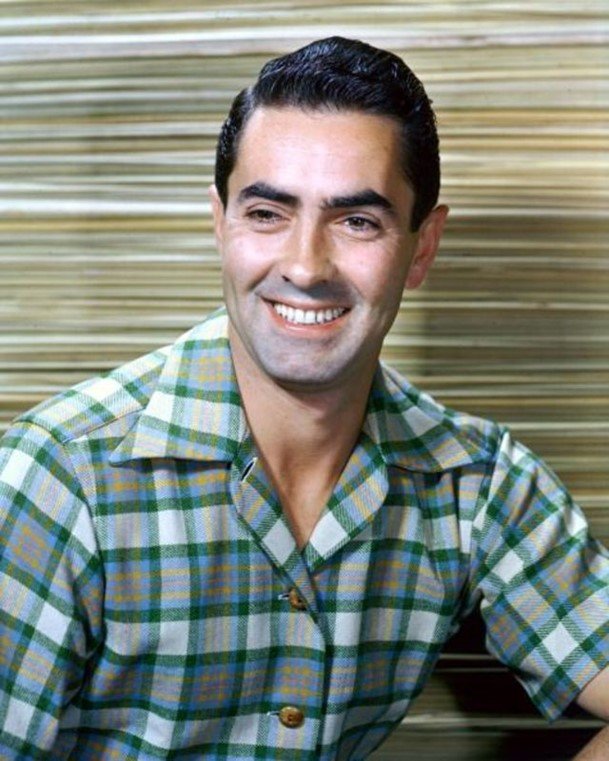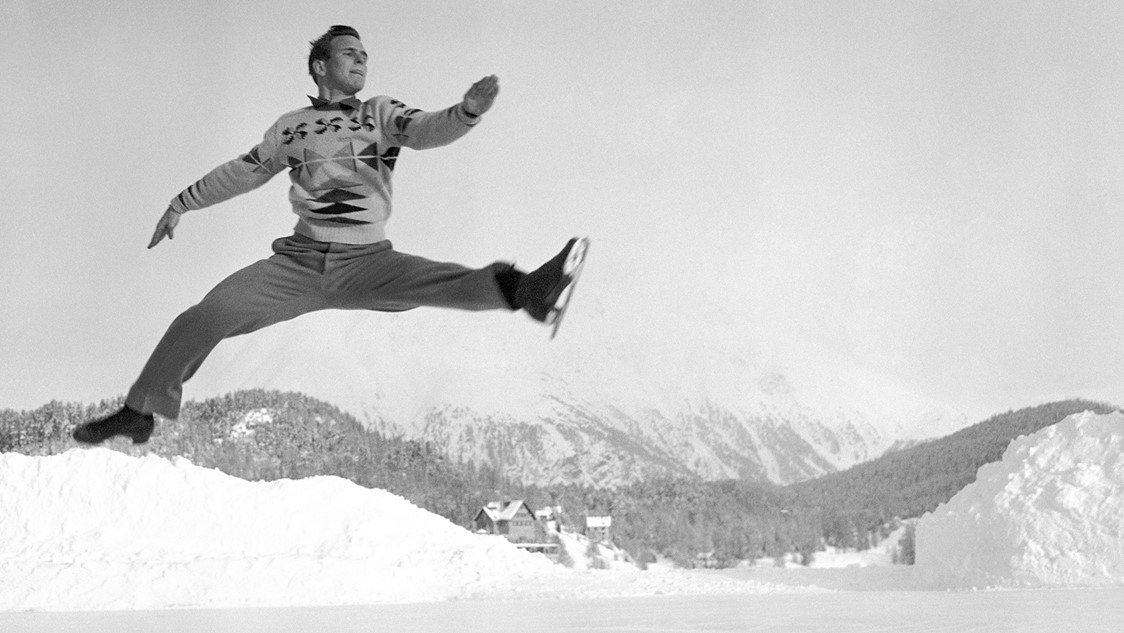Tyrone Power: A Prince of Actors
Tyrone Power
Spoken today, Tyrone Power’s name does not immediately bring to mind any one film, but rather Hollywood’s Golden Era. Power was truly a classic actor and a serious professional who captured the hearts of swarms of adoring women fans, while giving men a hero to cheer on.
Power was born in 1914 in Cincinnati, Ohio. As a young man, he decided to follow in his father’s footsteps as an actor. His mother consented, though admonishing him, “You must be the best!”
Little Ty at nearly four years old, with his sister Ann.
His smile was “like a sunburst” recalled a fellow actor.
For a while, Power was told he would never become an actor. Called simply “that kid”, he was given bit parts in films, and acted in community theater and on the stage. He finally floundered into the film Girls’ Dormitory (1936), in which he had a line which also served as an ironic announcement to the motion-picture business, “Well, here I am!” It was what Hollywood had been waiting for: The arrival of Tyrone Power, the next superstar.
Modern Screen quickly produced a lavish feature on him, which took pains to explain the most minute details, such as how he pronounced his name with accent on the second syllable: Tyrone, not Tyrone. “I like it that way,” he explained.
“More Power to him” extolled the movie magazines.
Nearly overnight, Power’s popularity soared; at the age of twenty-two, he was a leading man. He was recognizable for his remarkably dark eyes, pointed ears, and erect posture. In the years of 1939-1941, fans dubbed him “King of the Movies.” The determining factor then was his handsome face. Today, critics attribute the title to his acting.
With Linda Darnell in a publicity photograph for Mark of Zorro (1940). Supposedly, Power did not enjoy working with Miss Darnell until later on in his career.
Scene from The Black Swan (1942)
He was believable as a cowboy, as seen here in the 1951 film Rawhide.
As one of the most (if not the most) popular leading men of the era, Power starred mostly in action-adventure films. His acting was a fine mix of drama and realism, coupled with intelligent dialogue delivery. (As an actor he could be impulsive; sometimes he deliberately turned his face away from the screen.) He was never less than average; one never got B-grade fare when his name was on the credits. His dashing smile became famous, as did his grave frown. Among his most famous performances were Jesse James (1939), Mark of Zorro (1940), The Black Swan (1942), and Captain from Castile (1947). “One of the greatest stars Hollywood has ever known!” avowed the ever-laudatory Modern Screen.
The first marriage: Tyrone and Annabella. At left is the best man, Don Ameche.
Being such a big star, Power had little privacy. Here, Ty and wife Annabella relax and play a game in this obvious publicity shot.
After the outbreak of WWII, Power enlisted in the marines in 1942. He served nobly in the Pacific theater, returning to the United States in 1945 (remaining in the reserves until his death). After the war, he was somewhat altered in appearance and manner. Fans eagerly viewing his first post-war film, Razor’s Edge (1946), witnessed a Tyrone Power who was visibly leaner, now a little hollow-eyed, and certainly more serious.
One famous marine. Power was much respected by all who served with him.
Yet he was still, claimed some who knew him well, “better-looking offscreen than on.” His friends often remarked that he was a modest man determined to take acting seriously. “He was so beautiful,” close friend Loretta Young recalled; “he hated that.” Power himself stated, “Someday I will show all the [people] who say I was a success just because of my pretty face. Sometimes I wish I had a really bad car accident so my face would get smashed up and I would look like Eddie Constantine.” Power “showed them” with Nightmare Alley (1947), in an unglamorous role he had fought hard for, mainly as an effort to prove his acting capacity. In 2018, Power would be placed on a list of the most-popular male stars in film history.
A pensive Ty Power. Though fans and friends called him “pretty” and “beautiful”, he wished to be thought of seriously as an actor.
What was he like offscreen? He relished reading Shakespeare; his favorite food was avocados. “Ty was everybody’s favorite person,” applauded David Niven, “and all agreed that he was a great rarity—a man who was just as nice as he seemed to be.” Power had a great sense of humor and enjoyed playing pranks on fellow actors. His fondness for adventure and excitement made him uniquely well-suited for swashbucklers—even though he confided to actress Joan Blondell that he “detested costume sagas.” George Sanders recalled, “I shall always remember his wonderful smile, a smile that would light up the darkest hour of the day, like a sunburst.” Dutch-born artist Ernst Van Leyden praised Power as “a splendid example of manhood.” Tyrone Power’s second-born daughter, Taryn, said her father “set a high standard for the men in my life.”
Power was married thrice (Annabella, Linda Christian, Deborah Minardos) and had three children (Romina, Taryn, Tyrone Power, Jr.). Previously, he had considered uniting in matrimony with the likes of Lana Turner, Sonja Henie, and Loretta Young.
Power with his two daughters, Romina and Taryn.
One of the greatest tragedies to befall Hollywood was the sudden death (1958) of Power at the mere age of forty-four. He had been filming Solomon and Sheba in Madrid, Spain, when he had a heart attack; he died on the way to the hospital.
On his tombstone in Hollywood Cemetery are etched a few lines from Shakespeare’s Hamlet: “Good night, sweet prince, and flights of angels sing thee to thy rest.” This prince of actors, Tyrone Power, has left behind forty-eight films and a monumental legacy as a classic actor. His mother would have been satisfied that he was indeed “the best.”
Three years before his death, Power said, “If I had a chance to remedy the mistakes I’ve made in my life, I think I’d choose the same mistakes. The new ones might turn out worse!”
Quotations by David Niven and Taryn Power: tyrone-power.com.
Photograph credits— POWER (2), RAWHIDE: Pinterest; MAGAZINE (4): lanternmediahist.org; VEHICLE, ANNABELLA, MARINES, 1 OTHER: Jack’s Movie Mania (license); BLACK SWAN: listal; CHILDREN: hollywoodmuseum.com; WITH HAT, mikimemo.


















“I am pro-freedom and pro-decency.” Even as a popular leading man of the era, he wasn’t afraid to risk his film career by diving into Hollywood politics in the 1940s.